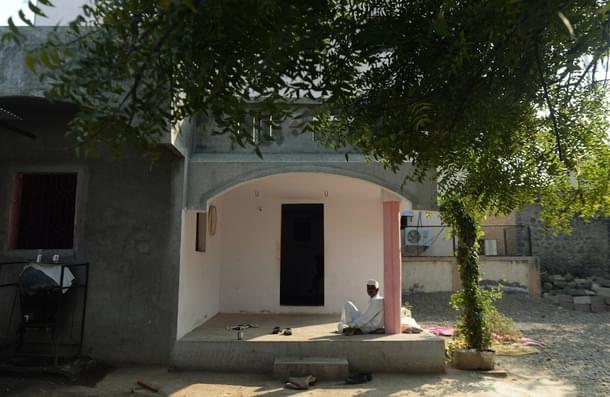Culture
A Pseudo-Modern Assault On The Cultural Heritage Of Shani Shingnapur
Shantipriya Arnal
Feb 09, 2016, 09:34 PM | Updated Feb 12, 2016, 05:19 PM IST
Save & read from anywhere!
Bookmark stories for easy access on any device or the Swarajya app.


The Shani Shingnapur temple is under attack by a group of devout believers in Shani Deva. Trupti Desai, a young woman activist, has taken it upon herself to challenge the practice in the Shani temple that allows men to stand on the foundation stone around the Shani idol but prohibits women devotees from doing the same. Her activism initially started with a demand that women be treated on a par with men at the temple.
The temple authorities, considering the growing belligerent stance of the Bhumata Brigade founded by Trupti Desai, conceded equality by prohibiting both men and women from standing on the platform, saying that only the temple priest will have access to the sanctum sanctorum to perform puja. Now one would think that that should have rested Desai’s grievance against the temple. But no, that kind of equality does not satisfy Trupti Desai. She has since taken umbrage at the purification ceremony conducted by the priests of the temple after one errant woman devotee had stepped on the platform a couple of months ago.
Desai’s latest demand is that she will not let go off her stir until the temple has both men and women priests who stand on the platform on alternate days to perform puja.
Before we take a stand to support either side, a little bit of history will be in order here. The Shani temple in Shingnapur is around 350 years old. It is said that the idol of Shani Deva, an iron and stone structure, came to the village on the night of a huge flood in the region and got stuck at a berry tree. When the unlettered villagers initially saw the large black boulder stuck in their fields, they wondered how such a large stone could have floated there. The story goes that when they poked the stone with sticks, blood oozed out of the stone. The panicking cowherds called the other villagers and everyone tried to see what should be done with it. The villagers tried various methods of moving the stone but in vain. Then a villager had a dream in which Shani Deva told him that it was He who had come to the village and instructed him on how the villagers should install the idol and build the temple.
Since then the poor simple village folk have lived life as dictated by Shani Deva. They have no doors and windows in their homes till date because Shani Deva had directed them thus. There is no roof over the Shani idol because He did not want it. The village residents do not consume meat or alcohol irrespective of their caste because Shani Deva has ordained it.

Over the years, the community has effected some changes to the original temple and practices such as building the platform around the idol. But they claim that even such changes have been directed by Shani Deva appearing in dreams of local stakeholders and insiders. It is their belief that if they effect changes to these cultural practices without His consent, it will bring bad tidings to their village.
It should be noted that the customs at the Shani temple evolved from personal experiences of the locals over the last three centuries in this remote rural region of Maharashtra. The tradition has been followed with faith and devotion – not thought and malice – in the true belief that Shani Deva presides over everything there. At a practical level, the belief has been good for the villagers. They have lived in peace and harmony. Their village has progressed and slowly prospered over the years as the power of the Shani temple brought new devotees from far off places. Consequently, the villagers see themselves as the trustees of the temple, vested with the responsibility of protecting its sacredness. In return Shani Deva protects them all.
Now comes Desai, her devotion cloaked in reason and her belief morphed by education to challenge the age-old practices of this rural society. Her thought, directed by the winds of globalisation, encourages her to take offence at some simple indigenous convention as being motivated by a desire to discriminate. Her modern education and Western outlook sees insult where none is intended and propels her to take cudgels against a small group of people driven by faith.
From calls for equality of worship, her fight now assumes a distinctly different dimension. It has the undercurrents of a sinister design to snatch the ‘adhikara’ of this increasingly popular Shani temple from the simple villagers. Being an outsider, she is seeking rights to dictate the manner in which it is run by calling for female priests. Using her activism, she is ‘invading the sacred’. It is the prerogative of the local stakeholders – the insiders – who have nurtured this temple through the centuries to determine when and what to change in their customs.
Even the United Nations has recognised that cultural practices across the world are under threat from globalisation and cultural homogenisation. The UNESCO Convention for Safeguarding the Intangible Cultural Heritage (2003) – to which India is a party – has sought to protect cultural diversity of all humanity. UNESCO asserts that preserving heritage is not only about buildings and objects but includes all things that give communities and groups – whether large or small – their identity and to which they have an emotional attachment.
I am shocked and concerned that our leaders and intellectuals, our media and NGOs are taking the side of the educated aggressor against this village community. A country which boasts of a tradition of unity in diversity, celebrates the many hues of its people and prides itself as the protector of the minorities and the downtrodden is watching while this temple management, not educated in English and the ways of the post-modern, comes under attack.
It is strange that Devendra Fadnavis, the Chief Minister of Maharashtra, appears to be in a hurry to defend equal rights for women, in utter and total disregard to the UNESCO Conventions ratified by the government of India with regard to safeguarding and protection of the diversity of cultural expression of minority communities. These conventions fully protect the poor villagers of Shingnapur. They can certainly seek redressal from the courts to protect their right to perpetuate their intangible cultural heritage.
It is ironical that Congress Vice President Rahul Gandhi, who positions himself as the saviour of minority interests, is silent on this matter. The Congress party should know that both the conventions were ratified by UPA-1. Fadnavis will be well advised to consult his Attorney General before coming to any hasty conclusion, for which his party will have to pay a heavy price later.
The trustees of Shani Shingnapur have already conceded the demand for gender equality in worship. Now, any interference in the practices of the local community will amount to ‘invading the sacred’ and can have widespread ramifications on the diversity of cultural expression in our country.





